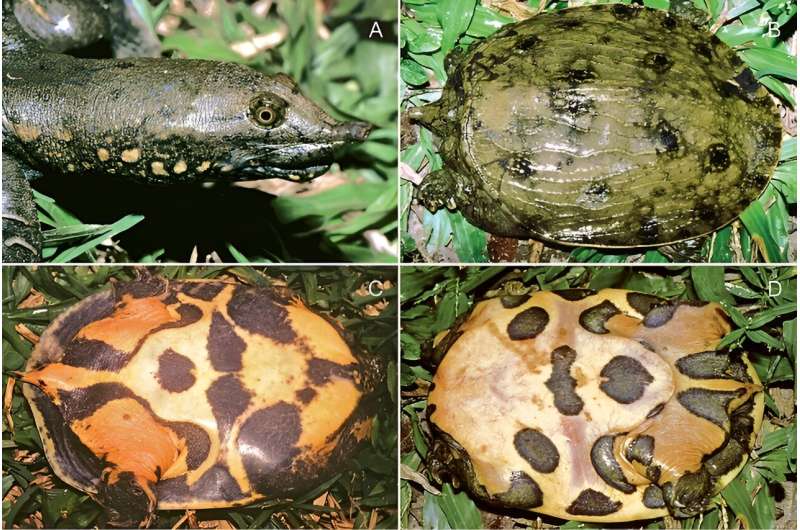This article has been reviewed according to Science X's editorial process and policies. Editors have highlighted the following attributes while ensuring the content's credibility:
fact-checked
peer-reviewed publication
trusted source
proofread
Breeding programs initiated in Vietnam to help turtle species threatened by extinction

Considered a delicacy in China and Vietnam, the spotted softshell turtle faces threats from overconsumption and habitat loss. Conservationists have initiated breeding programs in Vietnam to recover spotted softshell turtle populations.
Based on a literature study, field surveys across Vietnam, and genetic screenings of collected samples, researchers estimated the range and conservation status of Pelodiscus variegatus, the spotted softshell turtle. The data were then used to model the species' potential range in Vietnam. The study is published in Nature Conservation.
Alarmingly, although several protected areas in Vietnam appear to harbor suitable habitats for the species, no populations were identified in any of the sites, indicating it is especially susceptible to extinction.
To recover natural populations of the species, the Institute of Ecology and Biological Resources and Cologne Zoo, Germany, initiated an in-country breeding program. In late 2023, they released 50 young and healthy turtles to a site with suitable climate and habitat in northern Vietnam.
It is hoped that additional individuals will be reintroduced to protected areas in north-central Vietnam, the sanctuary of spotted softshell turtles, to reverse its declining trend and further contribute to the global Reverse the Red movement, a target best accomplished by applying the IUCN's One Plan Approach to Conservation.
Softshell turtles of the genus Pelodiscus are broadly distributed from southeastern Siberia through China to Vietnam. However, their range is currently extended to Indonesia, northern Australia, western Europe, North America, Hawaii, and Mauritius as a result of human transportation and breeding activities.
The turtles are considered a delicacy in China and some Southeast Asian countries. In China alone, each year hundreds of millions of turtles are traded, making them the most widely consumed turtles in the world.
Traditionally, this genus had been considered monotypic with only one recognized species, the Chinese softshell turtle (Pelodiscus sinensis). However, recent research has shown that the genus is much more diverse with at least seven species known to science.
Due to their morphological similarity, widespread farming activities, overharvesting, and their aquatic lifestyle, it is often difficult to study them in their natural habitat to better understand their distribution as well as their population and conservation status.
The spotted softshell turtle is facing tremendous threats, from habitat loss to overharvesting for food and genetic pollution because the Chinese softshell turtle has been farmed across the country, imperiling the native genetic sources.
As a result, the Turtle Taxonomy Working Group, the global authority on taxonomic and conservation status of turtles worldwide, provisionally classifies the species as Critically Endangered, the highest ranking for taxa most vulnerable to extinction.
More information: Minh Duc Le et al, Climatic niche modelling and genetic analyses highlight conservation priorities for the Spotted Softshell Turtle (Pelodiscus variegatus), Nature Conservation (2024). DOI: 10.3897/natureconservation.55.114746
Journal information: Nature Conservation
Provided by Pensoft Publishers



















